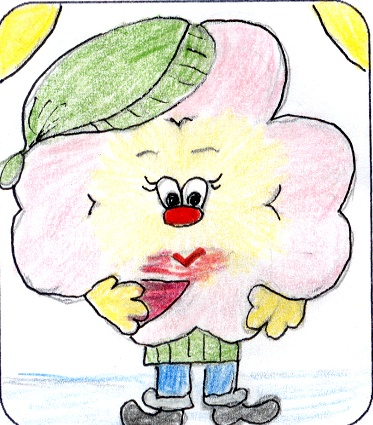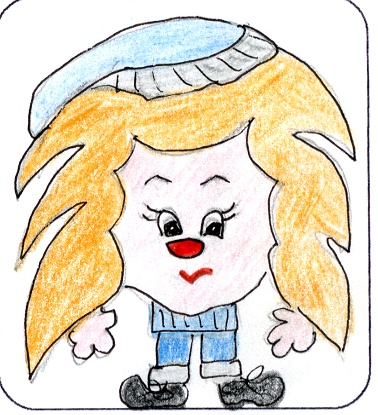The Cow swam under the Boat,
The Little Fish laughed to see such Fun,
And the Grey Goat buttoned her coat.

If you saw a goat buttoned in a coat;
If you saw a rat dressed up in a hat;
If you saw a lamb take a slice of ham;
If you saw a bear combing out its hair;
If you saw an ox opening a box;
If you saw a pig eat a nice new fig;
If you saw a mouse throwing down a house;
If you saw a stag picking up a rag;
If you saw a cow make a pretty bow;
If you saw a fly take its slate and cry-You would surely say, "What peculiar play!"
Or would surely sing, "What a funny thing!"
Enjoy! says Mama Lisa
Monday, 23 February 2009
Another little something from the man of the moment Mr Edward Lear!

And now a small poem from India written over a hundred and thirty years ago.

Realizador: Shelly wain
Categoria: Animação
País: Reino Unido
Duração: 3:21 Sinopse:
Based on the poem by Edward Lear. a cat lady sits alone in the
jungle.strange creatures twitter and hum.suddenly a warning cry is
heard "The Cummerbund is come".

She sat upon her Dobie,
To watch the Evening Star,
And all the Punkahs as they passed,
Cried, "My! how fair you are!
Around her bower, with quivering leaves,
The tall Kamsamahs grew,
And Kitmutgars in wild festoons
Hung down from Tchokis blue.


Below her home the river rolled
With soft Meloobious sound,
Where golden-finned Chuprassies swam,
In myriads circling round.
Above, on tallest trees remote
Green Ayahs perched alone,
And all night long the Mussak moan'd
Its melancholy tone.



And where the purple Nullahs threw
Their branches far and wide,
And silvery Goreewallahs flew
In silence, side by side,
The little Bheesties' flagrant air,
And of the angry Jampan howled
Deep in his hateful lair.




She sat upon her Dobie,
She heard the Nimmak hum,
When all at once a cry arose,
"The Cummerbund is come!"
In vain she fled; - with open jaws
The angry monster followed,
And so, ( before assistance came,)
The Lady Fair was swollowed.





They sought in vain for even a bone
Respectfully to bury,
They said, "Hers was a dreadful fate!
(And Echo answered "Very."
They nailed her Dobie to the wall,
Where last her form was seen,
And underneath they wrote these words,
In yellow, blue, and green:-
"Beware, ye Fair! Ye Fair, beware!
Nor sit out late at night, -
Lest horrid Cummerbunds should come,
And swallow you outright.
Note. - First published in Times of India, Bombay, July, 1874.

By Edward Lear.
This is also on the Gutenberg site
This eBook is for the use of anyone anywhere at no cost and with
almost no restrictions whatsoever. You may copy it, give it away or
re-use it under the terms of the Project Gutenberg License included
with this eBook or online at www.gutenberg.net

Sunday, 22 February 2009
Diddilydeedotsdreamland presents a touch of the late great Edward Lear. For the full page go to diddilydeedotsdreamland.zoomshare.com/
A. was an ant who seldom stood still
And who made a nice house in the side of a hill.
a! Nice little Ant!C. was a cat, who ran after a ratB. was a book with a binding of blue
And pictures and stories for me and for you.
b! Nice little Book.
But his courage did fail when she seized on his tail.
c! Crafty old Cat!E. was an elephant, stately and wise;D. was a duck with spots on his back
Who lived in the water and always said, quack!
d! Dear little Duck!
He had tusks and a trunk, and two queer little eyes!
e! O what funny small eyes!G. was a goat who was spotted with brownF. was a fish, who caught in a net,
But he got out again, and is quiet alive yet.
f! Lively young fish.
When he did not lie still, he walked up and down.
g! Good little Goat.I. was some ice so white and so niceH. was a hat which was all on one side,
Its crown was too high and its brim was too wide.
h! O! what a Hat!
But which nobody tasted, and so it was wasted.
i! All that good Ice.J. was a jack-daw who hopped up and down
In the principal street of a neighbouring town.
j! all through the town!
K. was a kite which flew out of site
Above houses so high quite into the sky.
k! Fly away, Kite
Wednesday, 18 February 2009
A simple way to learn the months of the year
The Winter Months
JANUARY



The beginning of the new year and the time to make New Year resolutions.
January
was established as the first the first month of the year by the Roman
Calendar. It was named after the god Janus (Latin word for door). Janus
has two faces which allowed him to look both backwards into the old
year and forwards into the new one at the same time. He was the 'spirit
of the opening'.
In
the very earliest Roman calendars there were no months of January or
February at all. The ancient Roman calendar had only ten months and the
new year started the year on 1 March. To the Romans, ten was a very
important number. Even when January (or Januarius as the Romans called
it) was added, the New Year continued to start in March. It remained so
in England and her colonies until about 200 years ago.
Monday, 9 February 2009
A WONDERFUL NEW ALPHABET FOR THE LITTLE ONES.
| |
  KAYLEIGH OF Q GARDENS KAYLEIGH OF Q GARDENSPRESENTS A WILD FLOWER ALPHABET OF FLOWER FAIRIES  A. for the Aconite, first of the year, with its pretty green ruff and its message of cheer.  B. for the Buttercup, able to hold Dewdrop and rain in its chalice of gold  C. for the Cowslip, sweet joy of the spring; When cowslips are blooming the nightingale sings.  D. for the Daisy, white star of the grass,  Lifting her bright eye to us as we pass. Lifting her bright eye to us as we pass.  |
Saturday, 7 February 2009
This is a wonderful story from Scotland many years ago.
If you ever find a copy of any of Arthur Mee's wonderful books, do buy it. Charity shops and car boot sales are an excellent source for finding fantastic books like this.
They may be old and a lot of things have been replaced by more modern ones.
But if you want Nursery Rhymes and Poems, History, so many, many things.

BRAVE GRIZEL HUME
Who was it skulking along in the gloom ? A dwarf ? A spy ? What is happening ?
That pile of stone is Redbraes Castle, and this is Scotland in 1678. The land is full of fugitives, of plots and traitors. Have you forgotten how, the reformation, Scotsmen bound themselves by a Covenant to resist Popery and foster the Protestant faith? When Charles the Second was allowed to return from exile he signed the Covenant, and signed it again on his coronation. But now that he is in is secure in power he has denounced the Covenanter's, and sends soldiers to hunt them to their death like wild beasts.
And that little slinking figure? It is a girl age thirteen called Grizel Hume. That great castle is her father's, but she goes in mortal terror. Suppose she met a soldier, a tinker, a poacher, who would spy on her, and take blood money for betraying her secret ? The little girl's knees tremble, and her heart beats so loudly that she thinks it can be heard a mile off. She carries a little bungle of cold, greasy food, smuggled from her plate during meal time. It was terrible when one of the little ones cried: "Oh greedy Grizel! She has eaten all
She and her mother exchanged horror-stricken glances; some words of reproof was said. Did the servants notice?
What was that ? She stands stock still, unable to breathe. Again the noise behind the hedge. Then a cat slips through and runs across the road, a wing dangling from her mouth. Grizel wants to laugh out loud in her relief, but she steals on in silence. How long and open the way seems each night ! But she must not think of that. Why, she did something far more difficult a year ago.
Robert Baillie lay in Edinburgh prison, innocent but doomed. Sir Patrick Hume had an important message for him, yet to go to Edinburgh was to fall into the soldiers' hands.
So 12 year old Grizel was sent, for who would suspect her ? Who would guess that she had taken part in the struggle for free conscience since she was 10 years old, or think her capable of taking part in a perilous plot ?
She was frightened then, as she was now, but did she not slip into the cell behind the warder and crouch in the dark corner safely after all ? Once more she saw the astonished faces of Baillie and the little boy who shared her father's imprisonment. Ah! where were they now ? The soldiers had dragged Baillie, dying and in his night clothes, to the scaffold, where he was hanged and quartered. If they caught her father - but no, they should not. She had got safely out of Edinburgh prison, and she would somehow carry this through, also.
Oh, they are sad times ! She wonders if one day a time will come when every man may hold his true opinion unpunished, and no children watch for the soldiers who will drag their father out to death. How happy such children will be - if they remember !
Now a spire rises out of the trees, and gravestones shine in the moonlight. Everything is very still apart from a whimpering wind. Grizel stops, checks her panting and waits for a cloud. As soon as the moon is veiled she darts across the churchyard, picking her way neatly among the graves and then cowering against the church door, slowly, cautiously, opens it. She is safely inside. A glance about the empty place and tiptoes across the aisle.
She is hidden in the shadow; now she is vanished. Where has she gone?
Grizel has crept into the family vault. Something stirs in the darkness, and a voice whispers her name. Fumbling hands find her, and her eyes and her arms are clasped round someone's neck.
"Father," she breathes. "How are you ? Not chilled to much I hope, you must be famished? Look, here is your poor food."
As he eats Grizel sits in the cold darkness and whispers cheerfully. The soldiers are still here. Again today they searched every nook and cranny of Redbraes. But they will go, and the evil times will pass, and right will triump ! She tells him of the children's quaint sayings, gives him news of the estate, and discusses various plans for his escape.
As last she kisses him goodbye till tomorrow night; then leaving him with the ancestors whose honour he keeps untarnished at so dreadful a price, she begins her return journey.
* * * *
Some years have passed; and we are in the parlour of a small Dutch house. A very beautiful girl is patching a coat while she hears her brothers lessons. Her own faded dress is darned at the elbows, but she rises with the air of a great lady when a visitor comes in.
The stranger is a tall, handsome youth who wears a cavalier- like finery of the Prince of Orange's Guards. As she salutes her the girl says:
"My father and mother are out walking, sir. I am sorry. Can I in some way serve you?"
To her surprise the youth answers with a Scottish accent: "I am heartily sorry too, mistress. I came to pay my humble duty to Sir Patrick, who was my father's friend. Will you tell him ? My name is George Baillie."
The girl starts, glows and exclaims: "Sir this is not our first meeting !
Then the youth cries: "I remember! The dungeon in Edinburgh ! "
They sit and talk of their fathers. Sometimes they are sad and wrathful, but they never regret all they have lost in a great cause. She tells him how, after his father's death his executioners hunted down Sir Patrick; how he hid in the in the family vault; how afterwards she and one other scrapped a hole in the earthen cellar floor at Redbraes, as he lay there; how at last he escaped to Holland; how his possessions were all seized, how she and her mother went to London; begging for enough to live on, and got a hundred and fifty pounds; how the family succeeded in getting to Holland, all but one girl, and how Grizel returned to Scotland to rescue her. Now they were bitterly poor, but they were all united and all free.
In the midst of such talk Sir Patrick returns, and when he knows the guardsman's name cries out: " No one could be more welcome to me !"
The years of poverty and exile go peacefully by. Grizel and George love one another, and even if they have little hope of marriage, they are content not to ask too much good fortune of life. Then her father is safe, they are betrothed and that is enough.
Her heroism and beauty make Grizel's story read like a romantic fairy tale, nevertheless it is the truth, even to the happy ever after because....
Let us return to Scotland. It is fourteen years since we saw Grizel steal out in the moonlight. Now the sun shines on banners and flowers, scarves and feathers, sleek horses and painted harness, as a procession sets out for the church where the bells are pealing loud enough to crack themselves. Charles and James have gone: the Prince of Orange is King of England, and Sir Patrick Hume is now Earl of Marchmont, Lord Chancellor of Scotland. At his side rides Lady Grizel, the most courted beauty in two countries. But her bridal white today is for no brilliant wedding; in the Church it is only George Baillie who waits for her.
And so we can all say "And they both lived happily ever after. " "

(1665—1746) was a Scottish song-writer, the eldest daughter of Sir
Patrick Hume or Home of Polwarth, afterwards earl of Marchmont. She was
born at Redbraes Castle, Berwickshire, on December 25 1665.
When she was twelve years old she carried letters from her father to
the Scottish patriot, Robert Baillie of Jerviswood, who was then in
prison. Home's friendship for Baillie made him a suspected man, and the
king's troops occupied Redbraes Castle. He remained in hiding for some
time in a churchyard, where his daughter kept him supplied with food,
but on hearing of the execution of Baillie (1684) he fled to the United
Provinces, where his family soon after joined him. They returned to
Scotland at the Revolution.
Lady Grizel married in 1692 George Baillie, son of the patriot. She
died on December 6 1746. She had two daughters, Grizel, who married Sir
Alexander Murray of Stanhope, and Rachel, Lady, Binning. Lady Murray
had in her possession a manuscript of her mother's in prose and verse.
Some of the songs had been printed in Allan Ramsay's Tea-Table
Miscellany. "And werena my heart light I wad dee," the most famous of
Lady Grizel's songs, originally appeared in Orpheus Caledonius (1725).
Sunday, 1 February 2009
It's winter in Peppercorn Green. Do come and take a trip with \King Pepper on the Googlenok Express
having adventures in




Chapter One
Princess Cornflower lay in her bed watching the snowflakes falling gently
past her bedroom window. She sat up in bed and pulled her dressing gown
round her shoulders. She smiled as she heard the sound of the
Peppercorn Express far away in the distance, it would just be entering
the tunnel at Sleepy Hollow.
She closed her eyes and pictured the frozen pond that
lay at the other end of the tunnel it
was to early in the morning for anyone to be out skating, but it
wouldn’t be long until all the children came out with their skates and
sledges and began to enjoy themselves.
Gosh, she was bored, five days she had been stuck in bed with marsh flu.
Five days of reading
books, running temperatures, drawing pictures and runny noses, but
today she felt really great, she had eaten all of her supper last
night, taken the last of the foul rhubarb tasting medicine that Dr.
Cornel had prescribed for her, and done everything, well almost





